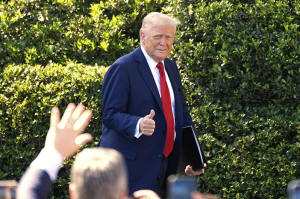Trump offers automakers some relief on his 25% tariffs, after worries
they could hurt US factories
[April 30, 2025] By
JOSH BOAK and ALEXA ST. JOHN
WASHINGTON (AP) — President Donald Trump signed executive orders Tuesday
to relax some of his 25% tariffs on automobiles and auto parts, a
significant reversal as the import taxes threatened to hurt domestic
manufacturers.
Automakers and independent analyses have indicated that the tariffs
could raise prices, reduce sales and make U.S. production less
competitive worldwide. Trump portrayed the changes as a bridge toward
automakers moving more production into the United States.
“We just wanted to help them during this little transition, short term,"
Trump told reporters. "We didn’t want to penalize them. ”
Treasury Secretary Scott Bessent, who spoke earlier at a White House
briefing on Tuesday, said the goal was to enable automakers to create
more domestic manufacturing jobs.
“President Trump has had meetings with both domestic and foreign auto
producers, and he’s committed to bringing back auto production to the
U.S.,” Bessent said. “So we want to give the automakers a path to do
that, quickly, efficiently and create as many jobs as possible.”
Trump signed one order on Tuesday that amended his previous 25% auto
tariffs, making it easier for vehicles that are assembled in the U.S.
with foreign parts to not face prohibitively high import taxes.
The amended order provides a rebate for one year of 3.75% relative to
the sales prices of a domestically assembled vehicles. That figure was
reached by putting the 25% import tax on parts that make up 15% of a
vehicle's sales price. For the second year, the rebate would equal 2.5%
of a vehicle's sales price, as it would apply to a smaller share of the
vehicle's parts.

A senior Commerce Department official, insisted on anonymity to preview
the order on a call with reporters, said automakers told Trump that the
additional time would enable them to ramp up the construction of new
factories, after automakers warned that it would take time for them to
shift their supply chains. The official said automakers would over the
next month announce additional shifts for workers, new hires and plans
for new facilities.
Stellantis Chairman John Elkann said in a statement that the company
appreciates the president's tariff relief measures.
“While we further assess the impact of the tariff policies on our North
American operations, we look forward to our continued collaboration with
the U.S. Administration to strengthen a competitive American auto
industry and stimulate exports," he said.
General Motors CEO Mary Barra said the automaker is grateful for Trump's
support of the industry, and she noted the company looks forward to
conversations with the president and working with the administration.
“We believe the President’s leadership is helping level the playing
field for companies like GM and allowing us to invest even more in the
U.S. economy," Barra said in a statement.
Jim Farley, president and CEO of Ford Motor Company, stressed that his
company does more than its peers to manufacture domestically.

[to top of second column] |

President Donald Trump arrives to welcome the Super Bowl champion
Philadelphia Eagles NFL football team to the South Lawn of the White
House, Monday, April 28, 2025, in Washington. (AP Photo/Alex
Brandon)

“We will continue to work closely with the administration in support of
the president’s vision for a healthy and growing auto industry in
America," Farley said. “As the right policies are put in place, it will
be important for the major vehicle importers to match Ford’s commitment
to building in America. If every company that sells vehicles in the U.S.
matched Ford’s American manufacturing ratio, 4 million more vehicles
would be assembled in America each year.”
But changing direction doesn't help an industry that thrives on
stability, said Sam Fiorani, analyst at business forecasting firm
AutoForecast Solutions.
“Finding a way to get the auto industry back working has to be paramount
in this,” Fiorani said. “The tariffs have not looked at this industry,
the way it works, and expect it to be able to jump and relocate
production at the blink of an eye. It just doesn’t work that way.
“Making a production change for vehicle manufacturing takes minimum,
months, and usually years, along with hundreds of millions if not
billions of dollars,” he added. "And so it is not something that they
take lightly.”
The Wall Street Journal first reported details of the actions. The White
House's Rapid Response account on X said Trump signed a second order
Tuesday afternoon to prevent his various tariffs from being stacked on
top of his existing taxes on imported autos and auto parts.
The tariffs imposed by Trump were seen by some as an existential threat
to the auto sector. Arthur Laffer, whom Trump gave the Presidential
Medal of Freedom to during his first term, said in a private analysis
that the tariffs without any modifications could add $4,711 to the cost
of a vehicle.
New vehicles sold at $47,462 on average last month, according to
auto-buying resource Kelley Blue Book. Tariffs stress the automotive
supply chain, a complex web which spans the globe. Not only do many auto
parts cross North American borders several times before being assembled
into a finished vehicle, auto manufacturers rely on suppliers around the
world for thousands of components.

Increased levies would certainly cost new car buyers — sensitive to
inflation — more, driving them to the used vehicle market and quickly
straining the availability of pre-owned cars. Tariffs also impact the
cost of owning and maintaining a vehicle.
The modifications come as Trump marks 100 days back in the White House
by going to Michigan, a state defined by auto manufacturing. Trump won
the state in last year's election by promising to increase factory jobs.
Still, it remains unclear what impact Trump's broader tariffs will have
on the U.S. economy and auto sales. Most economists say the tariffs —
which could ultimately hit most imports — would raise prices and slow
economic growth, possibly hurting auto sales despite the relief that the
administration intends to offer on its previous policies.
___
St. John contributed from Detroit.
All contents © copyright 2025 Associated Press. All rights reserved |